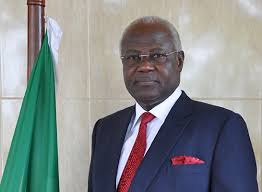APA-Freetown-(Sierra Leone) A cloud of political intrigue has engulfed Sierra Leone as former President Ernest Bai Koroma finds himself at the center of a dramatic power struggle, this time facing charges of treason over an alleged coup attempt on November 26, 2023.
Koroma, once celebrated for his decade-long leadership and post-war reconstruction efforts, now stands accused of orchestrating a plot to topple the current government.
Koroma’s political journey has been a rollercoaster of triumphs and turmoils. He took office in 2007, inheriting a nation ravaged by a brutal civil war. He oversaw a period of relative peace and prosperity, focusing on infrastructure development and economic growth. His achievements won him acclaim, earning him the title of “father of reconstruction.”
However, the tide turned in 2018 when he handed over power to then-opposition leader Julius Maada Bio. Tensions simmered beneath the surface, culminating in a disputed re-election campaign for Bio in 2023. Shortly after Bio’s narrow victory, in what many described as a politically charged climate, allegations surfaced implicating Koroma in a failed coup attempt.
Details surrounding the alleged coup attempt remain murky. Authorities claim gunmen stormed a military armory, prisons, and other key locations in November 26, 2023, with the aim of destabilizing the government. Koroma was subsequently arrested and charged with four offenses, including treason, misprision of treason, and harboring rebels. He vehemently denies all accusations, attributing them to political vendetta.
Koroma’s arrest has split the nation along political lines. His supporters, citing his proven track record and unwavering commitment to democracy, view the charges as a desperate attempt to silence a formidable opponent. Meanwhile, Bio’s camp paints Koroma as a power-hungry politician unwilling to accept defeat, posing a genuine threat to national security.
The future remains uncertain. The legal proceedings against Koroma could cast a long shadow over Sierra Leone’s already fragile political landscape. If convicted, the former president could face a lengthy prison sentence, further deepening the divide within the country. On the other hand, a successful defense could vindicate Koroma and potentially destabilize the current government.
This case goes beyond individual accusations. It raises pressing questions about Sierra Leone’s democratic maturity, the fragility of its post-war peace, and the potential for political manipulation. It underscores the need for a transparent and unbiased investigation, upholding the rule of law, and prioritizing national unity over partisan interests.
Whether Koroma emerges as a fallen hero or a villain in this political drama remains to be seen. Yet, the ripples of this saga will undoubtedly reshape the trajectory of Sierra Leone’s political landscape for years to come.
ABJ/APA


